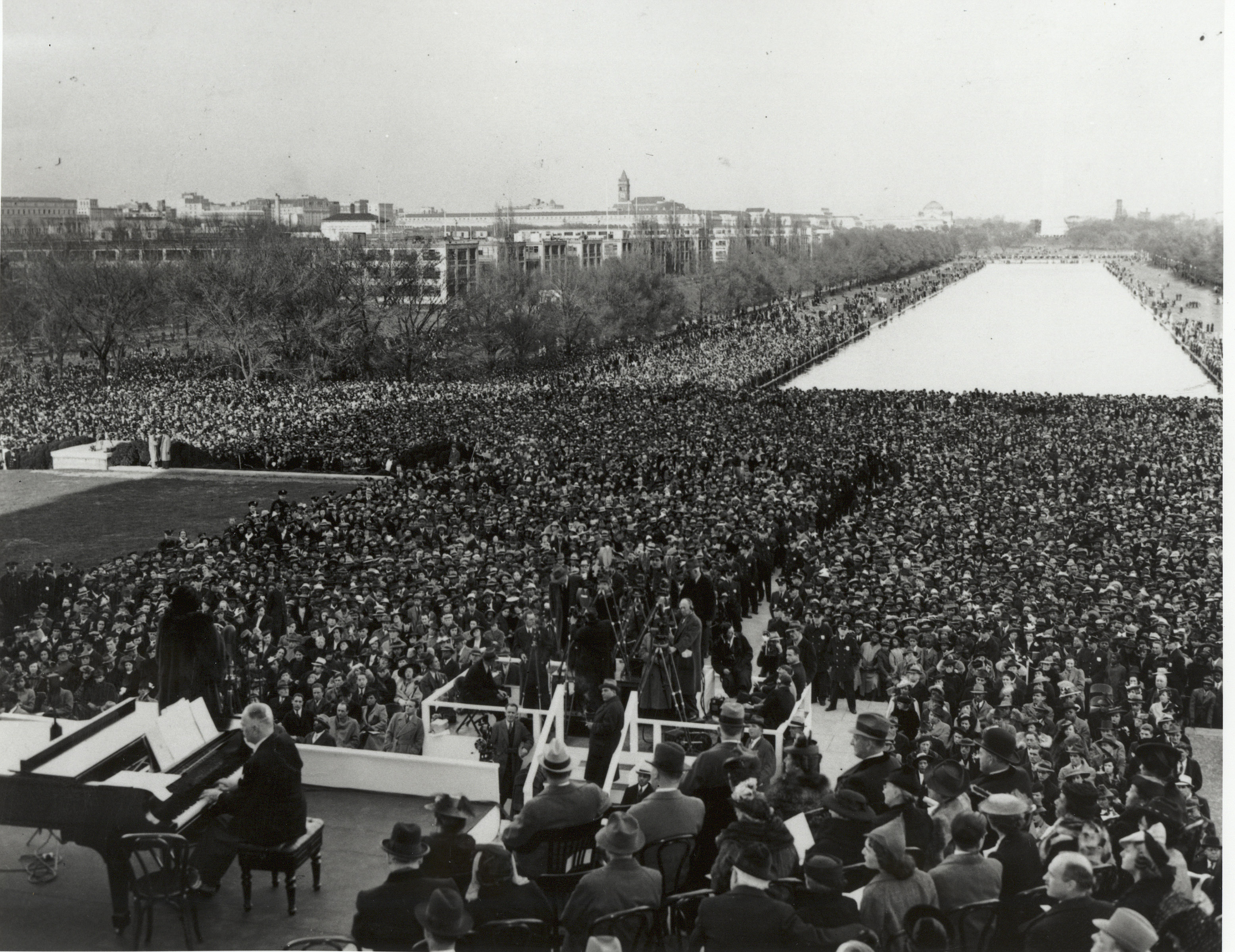
Marian Anderson Performs at the Lincoln Memorial
Rejected by segregationist Daughters of the American Revolution, Marian Anderson performs before an audience of 75,000 at the Lincoln Memorial.
View newspaper articlesDomestic concerns in the United States, including unemployment and national security, combined with prevalent antisemitism and racism, shaped Americans’ responses to Nazism and willingness to aid European Jews. The economic devastation of the Great Depression, combined with isolationist attitudes and deeply held prejudices against immigrants, limited Americans’ willingness to welcome refugees. Many issues that the American public perceived as having a critical impact on their livelihoods, security, and core values vied for public attention during this time and affected the manner in which Americans responded to events at home and abroad.
Marian Anderson was a premier concert singer of the 20th century. Still, like all African Americans in the 1930s, she faced racial discrimination as she traveled throughout the United States.
Beginning in 1936, Anderson sang an annual concert to benefit the Howard University School of Music in Washington, DC. In January 1939, Howard University asked the Daughters of the American Revolution (DAR) for Anderson to perform in their Washington, DC, venue, Constitution Hall, before an integrated audience.
At the time, Washington, DC, was still racially segregated, and the DAR was an all-white heritage association. Only whites were allowed to perform on the Constitution Hall stage, and black concertgoers were seated in a segregated section of the hall.
The organizers of Marian Anderson’s 1939 concert hoped that her fame and reputation might result in an exception to the DAR’s discriminatory policy, but their request was denied. Pressure mounted from the press, other artists, and politicians. Several prominent civil rights and labor organizations, including the Brotherhood of Sleeping Car Porters, the American Federation of Labor, and the National Negro Congress, formed a new organization called the Marian Anderson Citizens Committee (MACC) to pressure the DAR. Still, the DAR did not relent.
In protest, on February 26, 1939, First Lady Eleanor Roosevelt submitted her letter of resignation to the DAR president, and on February 27, 1939, Roosevelt addressed the issue in her My Day column, published in newspapers across the country. She did not mention the DAR or Anderson by name, but she simply stated, “To remain as a member implies approval of that action, therefore I am resigning.”
Roosevelt’s resignation propelled Marian Anderson and the subject of racism to the center of national attention. As word of her resignation spread, Roosevelt and others quietly worked behind the scenes promoting the idea of an outdoor concert at the symbolically important Lincoln Memorial.
President Franklin D. Roosevelt gave his approval, and on April 9, 1939, Easter Sunday, a diverse crowd of 75,000 people attended the outdoor concert. Hundreds of thousands more heard the concert over the radio. After being introduced by Secretary of the Interior Harold Ickes, who declared that “genius knows no color line,” Anderson opened her concert with My Country, 'Tis of Thee (America). With tears in her eyes, she closed the concert with an encore, Nobody Knows the Trouble I’ve Seen.
The DAR’s refusal to grant Marian Anderson the use of Constitution Hall, Eleanor Roosevelt’s resignation from the DAR in protest, and the resulting concert at the Lincoln Memorial combined into a significant moment in civil rights history that focused national attention on American racial discrimination as few events had previously done.
Learn More about this Historical Event
- Marian Anderson and the Easter Sunday Concert, April 9, 1939 (National Archives and Records Administration, Rediscovering Black History)
- File copy of letter from Eleanor Roosevelt to president general of the DAR. (National Archives and Records Administration)
- Eleanor Roosevelt and Marian Anderson (Franklin D. Roosevelt Presidential Library)
- February 26, 1939 - Eleanor Roosevelt Resigns from the Daughters of the American Revolution (Franklin D. Roosevelt Presidential Library)
- Marian Anderson Performs on the National Mall (National Geographic Society)
Bibliography
Arsenault, Raymond. The Sound of Freedom: Marian Anderson, the Lincoln Memorial, and the Concert that Awakened America. Bloomsbury Press, 2009.
Black, Allida. “Championing a Champion: Eleanor Roosevelt and the Marian Anderson ‘Freedom Concert’.”Presidential Studies Quarterly (Fall 1990), 719–736.
Search tips
These dates and keywords are associated with this historical event.